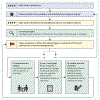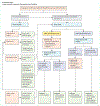Realigning diabetes regimens in older adults: a 4S Pathway to guide simplification and deprescribing strategies
- PMID: 39978368
- PMCID: PMC12178675
- DOI: 10.1016/S2213-8587(24)00372-3
Realigning diabetes regimens in older adults: a 4S Pathway to guide simplification and deprescribing strategies
Erratum in
-
Correction to Lancet Diabetes Endocrinol 2025. Published online February 17. https://doi.org/10.1016/S2213-8587(24)00372-3.Lancet Diabetes Endocrinol. 2025 May;13(5):e8. doi: 10.1016/S2213-8587(25)00071-3. Epub 2025 Mar 12. Lancet Diabetes Endocrinol. 2025. PMID: 40088920 No abstract available.
Abstract
Treating older people with diabetes is challenging due to multiple medical comorbidities that might interfere with patients' ability to perform self-care. Most diabetes guidelines focus on improving glycaemia through addition of medications, but few address strategies to reduce medication burden for older adults-a concept known as deprescribing. Strategies for deprescribing might include stopping high-risk medications, decreasing the dose, or substituting for less harmful agents. Accordingly, glycaemic management strategies for older adults with type 1 and type 2 diabetes not responding to their current regimen require an understanding of how and when to realign therapy to meet patient's current needs, which represents a major clinical practice gap. With the gap in guidance on how to deprescribe or otherwise adjust therapy in older adults with diabetes in mind, the International Geriatric Diabetes Society, an organisation dedicated to improving care of older individuals with diabetes, convened a Deprescribing Consensus Initiative in May, 2023, to discuss Optimization of diabetes treatment regimens in older adults: the role of de-prescribing, de-intensification and simplification of regimens. The recommendations from this group initiative are discussed and described in this Review.
Copyright © 2025 Elsevier Ltd. All rights reserved, including those for text and data mining, AI training, and similar technologies.
Conflict of interest statement
Declaration of interests MM receives grant funding from the US National Institutes of Health (NIH) and Dexcom; was a consultant and has received scientific advisory board fees from Sanofi and Medtronic; and declares royalties from UpToDate for writing and editing. ARK is supported by the National Institutes on Aging, NIH (grant K01-AG084971-01); and was supported by the National Center for Advancing Translational Sciences, NIH (grant K12TR004416). JJN is supported by NIH research grant (OT2OD032581); and receives compensation from Bayer, Sanofi, Novo Nordisk, Boehringer Ingelheim, Eli Lilly, Proteomics International, and Dexcom outside the submitted work. ASA was supported by the Duke Clinical and Translational Science Institute (award number KL2TR002554). NAA reports receiving consulting fees from Diathrive Health. TC-Y reports grant funding from Medtronic and Novo Nordisk and speaker honoraria from AstraZeneca, Boehringer Ingelheim, Sanofi, Eli Lilly, Medtronic, Geffen Medical, and Novo Nordisk. ESH is supported by grants from the National Institutes of Health (K24AG069080, P30 DK092949, R01 AG063391). SJL reports support to his institution from the National Institute on Aging (K24AG066998), travel reimbursement from the International Geriatric Diabetes Society, and unpaid board membership on the International Geriatric Diabetes Society. KJL receives grant support from NIH, other support from Centers for Medicare and Medicaid Services to develop and evaluate publicly reported quality measures, and royalties from UpToDate to write and edit content. LMM declares grants from the Canadian Institutes of Health Research and funding support from the Ontario Centres for Learning, Research and Innovation in long-term care at Bruyere and Health Canada; consulting fees from United Hospital Fund; speaker fees from Dalhousie University and Medisystem Pharmacy; travel support from the International Geriatric Diabetes Society and European Association of Hospital Pharmacy; unpaid membership on the Executive Committee of the Canadian Medication Appropriateness and Deprescribing Network; and position as Co-Lead of the deprescribing.org Team. NP reports support to her institution from HRSA (U1QHP33074); speaker fees from the Florida Osteopathic Medical Association, travel support from the International Geriatric Diabetes Society, and unpaid board membership on the International Geriatric Diabetes Society. REP has received speaker fees from Eli Lilly, Merck, and Novo Nordisk; consulting fees from AbbVie, Bayer, Bayer HealthCare Pharmaceuticals, Corcept Therapeutics Incorporated, Dexcom, Endogenex, Gasherbrum Bio, Genprex, Getz Pharma, Hanmi Pharmaceutical, Hengrui, Intas Pharmaceuticals, Eli Lilly, Merck, Novo Nordisk, Pfizer, Rivus Pharmaceuticals, Sanofi, and Sun Pharmaceutical Industries; and received grants from Biomea Fusion, Carmot Therapeutics, Dompe, Endogenex, Fractyl, Eli Lilly, Novo Nordisk, and Sanofi (directed to his institution through 12/31/2023 and directed to Dr. Pratley personally as of 1/1/2024). LR-M reports grants from DIABFRAIL-LATAM, Horizon Europe Program funded by the European Union (grant agreement number 825546); speaker fees from Abbott Laboratories, Nestle Health Science, and Sandoz Pharm; and travel support from the International Geriatric Diabetes Society. ET reports consulting fees from Vertex and Sequel. RSW reports clinical trial support to her institution from Tandem, Insulet, Diasome, Eli Lilly, Amgen, and MannKind Corporation; and received DexCom metres at reduced cost for use in some studies. ARK, GSM, AJS, SLS declare no competing interest.
Figures





References
-
- International Diabetes Federation. IDF Diabetes Atlas, 10th edition. 2021. https://diabetesatlas.org/atlas/tenth-edition/ (accessed Nov 15, 2022).
-
- Sinclair A, Saeedi P, Kaundal A, et al. Diabetes and global ageing among 65–99-year-old adults: findings from the International Diabetes Federation Diabetes Atlas, 9th edition. Diabetes Res Clin Pract 2020; 162: 108078. - PubMed
-
- CDC. Prevalence of both diagnosed and undiagnosed diabetes. 2022. https://www.cdc.gov/diabetes/data/statistics-report/diagnosed-undiagnose... (accessed Aug 31, 2023).
-
- Zoungas S, Patel A, Chalmers J, et al. , and the ADVANCE Collaborative Group. Severe hypoglycemia and risks of vascular events and death. N Engl J Med 2010; 363: 1410–18. - PubMed
Publication types
MeSH terms
Substances
Grants and funding
LinkOut - more resources
Full Text Sources
Medical
Miscellaneous

